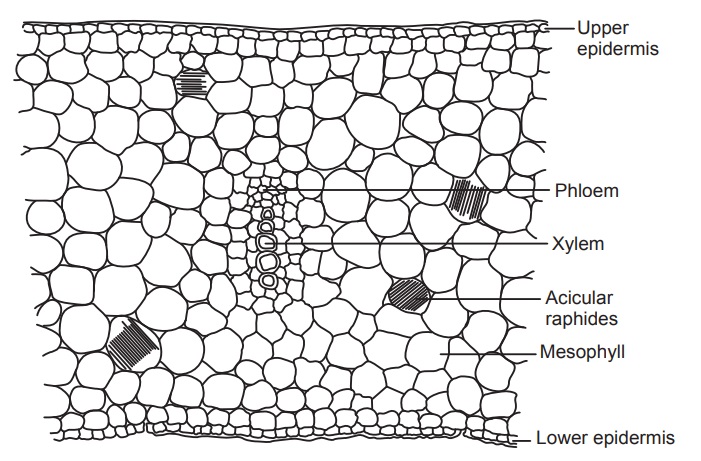Indian Squill
| Home | | Pharmacognosy |Chapter: Pharmacognosy and Phytochemistry : Drugs Containing Glycosides
Indian squill consists of dried slices of the bulb of Urginea indica Kunth., belonging to family Liliaceae.
INDIAN SQUILL
Synonyms
Sea onion, Urginea, Jangli Pyaj.
Biological Source
Indian squill consists of dried slices of the bulb of Urginea indica Kunth., belonging to family Liliaceae
Geographical Source
It is found throughout India (Western Himalaya, Konkan,
Coramandal coast, Bihar, etc.).
Cultivation and Collection
Though it is not been cultivated, it grows well at a
tempera-ture of 15–20°C and in sandy soil. The bulbs grow to full size within 5
years. The bulbs are collected after flowering, cut in to small slices and
dried under sun.
Morphology

Microscopy
A thin transverse section when observed under the micro-scope shows the following characters. Single layer of polygonal elongated epidermis is present which is covered with the cuticle. Mesophyll region consists of acicular calcium oxalate crystals, mucilage sheath, small round starch grains and vascular bundle (annular and spiral xylem vessels).

Chemical Constituents
Indian squill contains cardiac glycosides, similar to
Euro-pean squill. Mucilage is present in mesophyll cells.
Chemical Tests
1. Mucilage stains reddish purple with
iodine water where as European squill does not.
2. Colarin solution stains mesophyll
region red.
Uses
It is used as cardiotonic, expectorant, stimulant, diuretic,
cathartic. It is also a bronchodilator and anticancer agent.
Other Species
Scilla indica Baker (L. hyacinthina, Roth.), a native of India and Abyssinia, has a bulb often confused in the Indian bazaars
with the preceding, but easily distinguished when entire by being scaly, not
tunicated, its cream coloured scales overlapping one another. The bulbs are
about the size and shape of a small pear, somewhat smaller than those of U. indica. It is considered a better
representative of the European Squill. It has a nauseous odour and a bitter
acrid taste. They are collected soon after the plants have flowered, divested
of their dry, outer, membraneous coats, cut into slices and dried.
The chief constituents are bitter principles; similar to the
glucosidal substances found in ordinary Squill, and needle shaped crystals of
calcium oxalate are also present. The drug possesses stimulant, expectorant and
diuretic activity.
